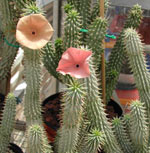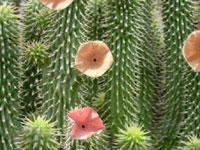|
"Imagine not being hungry all day without feeling side effects typical of diet pills, like a racing heart or queasy stomach." CBS News, 60 Minutes, talking about Hoodia |
|
Hoodia gordonii, a natural appetite suppressant
Hoodia is a Succulent botanical and is part of the Genus: Trichocaulon and belongs to the Family Name: Asclepiadaceae. There are approximately twenty plants within the Hoodia genus family, however, Hoodia Gordonii is the unique plant that South African San bushmen have used for generations to endure long hunting expeditions. Hoodia Gordonii is a leafless spiny succulent plant ( not a cactus ) with fleshly finger-like stems. Rows of thorns are present along the stems, bearing flesh coloured flowers. Hoodia Gordonii grows naturally in the harsh desert conditions of South Africa. Now Hoodia Gordonii has been found in the semi-deserts of Zambia, Zimbabwe, Botswana, Namibia, Angola, the Republic of South Africa, and now found in some other arid regions of South American Nations such as Chili, Peru and some regions of West China including Gansu, Sichuan and Shanxi. Thank you, the second Hoodia Gordonii shipment arrived yesterday April 4, 2005. By the way Hoodia is working very well I lost 12 lbs or (5.5 kg) in 2 months. Not dramatic but then again losing weight slowly is the best way to go. At this stage I don't pay attention to carbohydrates, fats, sugars and other diet fads. Regards - G D B (USA) Scientists at the South African Center for Scientific and Industrial Research were the first to successfully prove that Hoodia contains a miracle molecule that suppresses the appetite. Later, a human clinical trial was conducted by scientists in Leicester England. A group of morbidly obese men and women participated. Half the group were given Hoodia and half were given a placebo. At the end of 15 days, the group on Hoodia had reduced their food intake by 1000 calories a day. Given the average daily diet is around 2200 calories, this was a stunning success. Mass global interest has been shown for Hoodia since Pfizer, the international pharmaceutical giant, started to research Hoodia's potential to help people with obesity. Pfizer recently discovered Hoodia and decided to invest millions into researching the plants benefits as a new drug that would help with obesity. The research published by this company has catapulted Hoodia into the international spotlight. Laboratory experiments show animals automatically restrict their food intake when taking hoodia orally. Rats, a species that will eat anything from meat and plants to indigestible fiber, lowered their dietary calorie intake to a degree that made them get thin when fed comparative amounts of hoodia. Hoodia is registered as a protected species to prevent Bio-Piracy but is allowed to be grown on a handful of commercial farms in South Africa owned by private farmers. The Hoodia Gordonii plant originated in the southwestern part of Africa and grows best in the semi-arid areas of South Africa primarily the Kalahari. In its native habitat it is extremely difficulty to identify because it looks similar to succulents of the same family of which there are many. Only an experienced botanist or as the case in South Africa with Hoodia Gordonii a San people can identify the plant prior to it's blooming. There are 13 species of Hoodia which are native to Southern Africa but ONLY ONE variety - the "Gordonii" has the needed natural ingredients for weight loss. If you purchase the cheap imitation products sold by people out of their garage that you see on EBAY, and in the Google and Yahoo ads you will NOT have the results shown on the Personal Diet Results pages. Folks I have been through this over and over - read about the nineteen companies that have sent me Hoodia Gordonii Cactus products to test and how only a couple of them really work. So buying hoodia is very difficult. It's expensive. And, naturally, there are a lot of fakes on the market. Even now, there are only a few hundred acres of hoodia growing on commercial farms, and the plant is highly susceptible to being wiped out by rather mysterious conditions. To make matters even more challenging, Hoodia grown in South Africa under the San tribe's influence is required to be grown under organic conditions. That means they can't use pesticides. Entire crops have been known to vanish virtually overnight thanks to the ravages of various insects.
Education for life improvement
|

